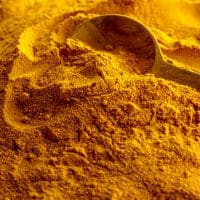The active ingredient in turmeric – the spice that lends curry its characteristic color, curcumin has been found by previous studies to exert antioxidant and anti-inflammation effects. P. Mirzabeigi, from Tehran University of Medical Science (Iran), and colleagues enrolled 33 man and. women with coronary artery disease (CAD), who were randomly assigned to receive either a curcumin supplement (500 mg curcumin C3), or placebo, for two months. The group receiving curcumin supplements demonstrated significant reductions in serum levels of low-density lipoprotein (LDL, “bad” cholesterol), as well as triglycerides. Other markers of inflammation in CAD, including total cholesterol, HDL (high-density lipoprotein, “good” cholesterol), blood glucose and hs-CRP levels, remain unchanged.
Curry Compound Curtails Coronary Artery Disease Markers
Mirzabeigi P, Mohammadpour AH, Salarifar M, Gholami K, Mojtahedzadeh M, Javadi MR. “The Effect of Curcumin on some of Traditional and Non-traditional Cardiovascular Risk Factors: A Pilot Randomized, Double-blind, Placebo-controlled Trial.” Iran J Pharm Res. 2015 Spring;14(2):479-86.
RELATED ARTICLES




